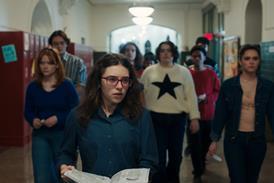2003 was the year that Old Europe, to steal from Donald Rumsfeld's war cry, took a reality check in preparation for the New. Local film support apparatuses were re-engineered, national boundaries questioned and distribution-led cinema more fully embraced. Vivendi finally surrendered Universal and with it Europe's ill-advised claim to studio status. It was Goodbye Lenin, but also hello to piracy after 770,000 counterfeit copies of Europe's best picture surfaced on Germany's streets before the official DVD had even hit shelves. Too bad, the industry's heavy-handed response to this burgeoning black market was itself so tainted.
As we welcome in 2004, here's a look at ten stories that helped shape the twelve months just gone by in the international film marketplace. For more on the year's highs and lows see the special end-of-year weekly print edition of SCREEN INTERNATIONAL:
PIRACY ' A SHOW STEALER
Movie piracy not only plagued the industry worldwide, it infected much of its thinking. Hollywood blockbusters blanketed the planet with day-and-date releases. Critics were frisked at press-only screenings. Studios battled with electronics manufacturers over copyright protection. And awards voters were banned by the Motion Picture Association of America from watching screener tapes at home ' until a New York judge overturned the prohibition for violating the interests of smaller films. All this in the name of ridding what Mpaa chief Jack Valenti calls "a malignant fungus on the face of our industry". That's piracy, he means, not smaller films.
WEAPONS OF MASS DISTRIBUTION
The historical epic is back. Armed with ever more dazzling computer-generated effects and Moroccan extras, Hollywood is doing battle with swashbuckling spectacles not seen since the 1960s. No wonder budgets are soaring. Last year's studio film cost an average $58.8m. That figure that can only rise once Troy, Alexander, Van Helsing and King Arthur enter the equation. To recoup those investments, US studios have no choice but to blitz the global marketplace. This leaves local distributors with no option but to respond with saturated releases of their own. Look at Norway: Finding Nemo is the widest ever release there with 110 prints, but SF's Norwegian romantic comedy The Woman Of My Life was not far behind with 100.
SEQUELITIS RELOADED
2003 was the year of the one-week wonder as films opened to massive numbers and then just as quickly fell into box office oblivion. The Matrix Revolutions epitomises this hit-and-run syndrome, but similar fates awaited so many other wide releases, including sequels to Legally Blonde, Lara Croft: Tomb Raider, Bad Boys, American Pie and Charlie's Angels. Not that sequels are history. Some, such as X2, T3 and The Matrix Reloaded, stayed the course. And you can also be sure that The Lord Of The Rings finale will eclipse the $920m scored by the second instalment; and that Harry Potter 3 will still be next summer's film to beat. With a sequel to Pirates Of The Caribbean already green-lit, what are the odds on seeing the further adventures of Bruce Almighty, Nemo and Elf'
HOME BOX OFFICE BONANZA
We're not talking HBO here ' although the iconic pay-network did enjoy a banner year, winning the top jury prizes at both Sundance and Cannes 'but a booming home box office of a more literal kind. The DVD phenomenon, coupled with the latest in wide-screen televisions, has given rise to living room movie theatres whose revenues eclipse those of the multiplex. Every week another DVD record falls to the point where the theatrical release is becoming window dressing for the disc ship-out. Not just Stateside; in Germany, DVD sales outpaced grosses for the first nine months in 2003 ' even with all the low-priced catalogue titles. Now if only we had time to actually watch all those extras.
IN FROM THE COLD
"It's just incredible ' especially for a German film in the German language, this ugly language," exclaimed producer Stefan Arndt after his triumphant Good Bye, Lenin! was named best European film at this year's European Film Awards, an event that saw several other German productions also nominated. But it's not only German cinema that emerged from the industry wilderness this year. Russia, too, showed signed of creative renewal, with The Return ' appropriately enough ' winning the Golden Lion at Venice. With a population of over 140 million, Russia represents one of the few untapped opportunities remaining for the cinema industry, noted Dodona Research. Within five years, it is expected to become the sixth highest grossing cinema market in Europe, with the US studios at the forefront of the revolution. What Cold War'
LOCATION PIMPING
To the chagrin of Californians, and the state's new governor, Arnie, the rest of the world wants their big budget productions and is doing whatever it can to woo runaway dollars to their backlots, facilities and tourist attractions. Ireland extended its tax breaks; the UK is likely to model its revamped incentives on Luxembourg's tax credits; Canada expanded its labour-based system; and France took shelter in a new 'credit-bail' that gives produces a 20% rebate. The next hot zone on the horizon is expected to be Hungary. Even beyond the soft money seductions, foreign locations offer direct commercial knock-ons. The Last Samurai, Kill Bill and The Matrix trilogy, for example, all reaped large box office rewards in Japan after incorporating Japanese settings and elements. The Matrix Reloaded earned $100m in Japan alone.
DOCU-MANIA
This year's vintage of theatrically-released documentaries were so full of life, colourful characters and storytelling twists that they made most Hollywood drama look anaemic. Their box-office success was no fiction either: this year's documentary Oscar winner, Bowling For Columbine, ranks as one of the most successful documentaries ever, with more than $50m worldwide. But Michael Moore did not have the field to himself: films like Spellbound, Capturing The Friedmans and Etre Et Avoir in France all turned in impressive performances. So impressive that the main subject in Etre Et Avoir saw fit to sue the director for a slice of the profits after nearly two million of his countrymen had paid to see his teaching heroics at their local movie-house. The truth hurts in so many ways.
DEATH OF A SALES MARKET
The caravan of international film traders face their worst nightmare next year: two autumn markets, some 6,000 miles apart on the rights-buying trail. Despite the best efforts by Afma's rank-and-file to kill off Mifed in the name of commercial imperatives, some shred of the Milan market will likely hang on in the Fiera. But even if that venerable market fades, other trading arenas are just as quickly blossoming on the overcrowded calendar. Next year will see an expanded CineMart in Rotterdam, an enlarged European Film Market in Berlin, not to mention increasingly vital pit-stops in Park City, Pusan and Toronto, and the various regional project forums that are becoming an alternative funding system for indie features. So many frequent-flyer miles, so little sleep...
DOLDRUMS & DIRE STRAITS
In search of the fabled Great Australian Comedy That Will Crossover To The World, local producers pulled out the stops in 2003, hoping to emulate The Castle or Muriel's Wedding ' or even Crocodile Dundee. Australia's excellent acting ensembles did their level best, but screenplays were generally short of new ideas, believable situations, or even laughs. And on top of all their woes, Australia's top sales agent, Gary Hamilton, decided to decamp to a more hospitable cinema climate in the UK. Not that Australia is alone in suffering right now: Mexican cinema is in a paralysing state of uncertainty, France has lost the knack for action event pictures and Koreans are fighting tooth and nail to keep their screen quotas alive. But despair not. Germany's renaissance in 2003 suggests it will only be a matter of time before all get their mojos working again.

















No comments yet